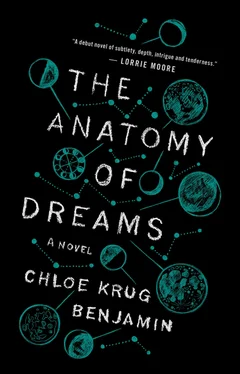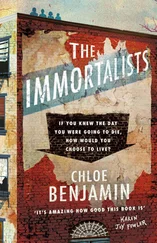At the landing, it took a left and followed the hallway to our room. Another left. Inside the bedroom, it threaded down the wall next to Gabe’s side of the bed, and then it disappeared behind his night table.
I crouched and tried to pull the table forward, but it was too heavy to budge. What could he be keeping in those drawers? I opened them: scientific encyclopedias, a thick hardcover on rail transportation in the US. A large, knobbed fossil he had found on Martha’s Vineyard and insisted on bringing home, lugging it through Boston Logan in his carry-on. I laid each item carefully on the bed. Then I lifted the table and knelt next to the wall, where the plug finally found its entrance.
The wire had been cut. About two inches from the wall was a tiny, rectangular black box, about half the size of a deck of playing cards. Two black probes extended from one end of the box, clipped to the ends of the severed wire.
I shook my head. Where had I seen something like this before? A movie? A television show? The sleek little bug with clips as sharply ridged as incisor teeth. The innocuous black box, deadpan, poker-faced. Downstairs, the door opened and closed with a bang.
“Sylve?”
I sat in front of the bug as if rooted while Gabe climbed the stairs. The door flew open—we were accustomed to barging in with the heedless entitlement of college roommates. He stood in the doorway, panting, his hands braced in the frame.
“I just wanted . . .” He inhaled. “I wanted to say I’m sorry. For yelling at you. I shouldn’t have. You don’t need me to tell you how to talk to Keller. You can talk to him how—however you like.”
It was then that he looked past me to the wall. He stared at the bug.
“Gabe?” I swallowed—a hard, scratchy knot. “What is this?”
He squatted next to me and picked it up in one hand. Shook it lightly, as if to test its weight.
“When did you find this?” he asked.
“Just now.”
The sun was sinking its little mound below the horizon of the city. Pink light skimmed Gabe’s cheek.
“Sylvie.” His voice was low, steady. “Let’s not jump to conclusions.”
“How many conclusions can there be? Someone’s been listening to our calls, and the only person who’s been here is Keller. Keller, and you and me.”
Gabe’s hair was wild, his breathing labored. He looked at me a beat too long.
“Oh, Gabe,” I said. “You can’t think I had anything to do with this.”
“I didn’t say that.”
“Why can’t you admit that he’s fallible, that something incredibly sketchy might be going on?”
“What do you mean, something sketchy?”
He was still squatting, and one of his knees cracked. I climbed over him, leaving the bug by the wall, and padded quickly downstairs for my backpack. I brought it up to the bedroom, tossed it on the bed, and rooted around for the manila folder I’d taken from the lab.
“I found this today,” I said, handing it to him. “It was in the filing cabinet, wedged beneath the others.”
Gabe opened it gingerly and sifted through the papers inside.
“Look.” I leaned toward him, pointing. “It’s Keller’s wife, her intake form. She had some sort of RBD—sexsomnia, it sounds like, if that even exists. She was tracking herself, keeping a kind of diary. Look at the handwriting. You recognize it, don’t you?”
Gabe was silent. His body was perfectly still, but his eyes shifted across each page with incredible speed.
“I don’t trust him,” I said. “He’s never told us about this, never even alluded to it.”
“But why should he have told us? It was personal.”
“That’s my point,” I said. “Science is supposed to be impartial. It’s supposed to be objective. And I’m starting to feel like Keller’s mission isn’t professional—it’s personal. It’s like he has a vendetta, Gabe—like he’s trying to avenge her by curing other people of the same sickness.”
“And what’s so wrong with that?”
I remembered something Gabe said months ago, last fall—both of us standing in the kitchen at dusk as the hazy golden light of evening slanted through the window. But what’s more ethical than helping the people you know? Why should the process be so quarantined, so sterilized? Science should be applicable to real life—so why should we divorce it from love?
Outside the window, a crow paused on the fence. It trained on us one dark, beady eye before sweeping away.
“How much do you know about this?” I asked.
“Nothing,” said Gabe. “Nothing.”
“Then why are you protecting him?”
“I’m trying to see the good.”
“But what if you’re wrong?”
My faith in Keller had begun to erode years earlier, I think. But my faith in Gabe was, until that moment, mostly intact. Who else did I have but him?
We looked at each other carefully. Then he sat next to me on the bed, kissed the line of my jaw.
“Everything I do,” he said, “I do for you. For us. You know that, don’t you?”
Was that romance? I had known no love but his. Rolling through the grass like wolves, limb for limb, scavenging for attention—the brute hunger, the desperate force—and then, days when we hunted alone, nosing our way through the brush and picking at stones, days when our tracks were parallel but far apart. That Christmas, my mother had called, her voice crackling with static, and asked if I thought I would marry him. I looked over at Gabe, who was making oatmeal at the stove, holding a copy of the San Francisco Chronicle in his non-stirring hand. What could I tell her—that we were caught in the purgatory of Anne’s trial, a trial that would name her fate but seemed just as likely to direct our own?
I knew Gabe well enough to know when he was lying. Even so, the truth seemed elusive, as faint and faraway as half-hidden stars. I was afraid to look up. Why, I should have asked myself, did Gabe not suggest we dismantle the bug? As he walked to the bathroom to shower, I crouched on the floor and unclipped its teeth.
• • •
Psychologist Abraham Maslow’s hierarchy of needs lists physiological needs—for breathing and food, for sex and sleep—as the most basic of all drives. Next comes the need for safety, followed by the need for belonging. But what about the need to forgive? There is no belonging without it, no safety, no love. And so I found myself climbing into bed with Gabe that night. I started to read my novel, but Gabe was fidgety: he rustled through the Isthmus , discarded it, futzed with his radio alarm clock. Music crackled to life: Jay Z, a classical crescendo, a mariachi band.
“Can you turn that off?” I put my book down. “I’m trying to read.”
“Hold on.”
He fiddled with the dials, and Diana Ross’s “Ain’t Nobody’s Business If I Do” came through, rich and jazzy and clear. Gabe began to groove in his seat. A pillow bounced and fell off the bed. He got to his feet, still on the mattress, and extended his hand.
“Dance with me?” he asked.
“Gabe—”
“Come on, Sylve. We need a little music.”
Diana’s voice faded, and the Jackson 5 took her place. I want you back , they crooned, and what could I do but take his hand? We jived down the mattress, jumped and rebounded; we spun and dipped and clung. Gabe knelt, playing air guitar, shaking his head until his eyes were masked by hair. For seconds, it was possible to forget everything we had ever done to each other. Hysterical with need, we yanked the curtains shut. As the furnace exhaled heat, we stripped off our clothes and climbed back onto the bed.
But something wasn’t right, something had been lost, and we scrambled for it with increasing panic. We searched coolly at first—an arm adjusted, a shift in the hips—and then hastily, furious in our bafflement and so thorough that any desire turned to exhaustion, though we couldn’t stop. We wouldn’t. We tried positioning Gabe behind me and above me, my ankles on his shoulders or cast to the left. I lay on my back, on my stomach, on my side; I crouched on my knees with my elbows pointing into a pillow and my forehead bumping the bed frame. We sat up, my legs pretzeled around Gabe’s waist, and rocked. The radio music faded; a commercial came on. Gabe braced himself against our comforter, his fists sinking into the down, and thrust with as much determination as I’d ever seen in him. It was no use: he was softening, his face twisted with humiliation.
Читать дальше












